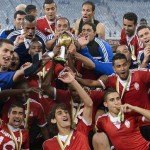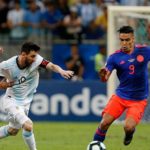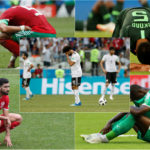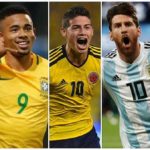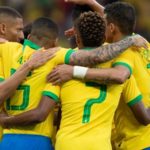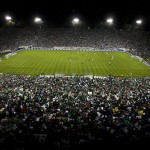Africa Cup begins on Saturday in South Africa

Last update 18 January, 2013 por Julio Muñoz
The Africa Cup 2013 It is an unmissable tournament for football lovers. Not only for what is seen on the field, but for everything that surrounds the sport itself. For a little less than a month, that unknown continent for many is mobilized for the same reason that we are mobilized here: la pelota. For a few days, daily hardships are mixed with the joy of the most popular game on the planet.. That makes football wonderful.
Although there is always the possibility of discovering new figures, the vast majority of the stars of the tournament are already playing in European football. Sin embargo, it is a very valuable chance to see them with their national teams, in order to begin to throb what can happen in the World Cup.
Unlike the continental competitions in South America, Europe and Asia, the Africa Cup is held every two years. on the last occasion, the modest Zambia gave the big surprise and was crowned champion in Equatorial Guinea and Gabon, the same country where an entire Zambian squad had lost their lives in a plane crash more than two decades ago. The Chipolopolo won the title thanks to their defensive strength and goals from Christopher Katongo. A) Yes, they gave the great surprise of the last years.
That tournament was atypical because they failed to qualify great regional powers like Nigeria, Camerún, Sudáfrica, Senegal, Egypt and Algeria. En cambio, Today they will be South Africa again, Nigeria and Algeria, but the Pharaohs will be absent again, The Selected with the most titles in history.
The venue chosen 2006 it was Libya. Sin embargo, the political crisis that ended with the fall of Muammar Gaddafi in 2011 led the African Football Confederation to suspend the championship in that country. Entonces, Egypt and South Africa applied, that had just organized a great World Cup and ended up being chosen to host its second Africa Cup. En la primera, en 1996, was crowned champion under the gaze of Nelson Mandela.
GROUP A
It will be a very even group., although the local South Africa is the main candidate to qualify for the quarterfinals, despite his recent bad results. Half of the local squad play for Orlando Pirates and Kaizer Chiefs, the two most important clubs in the country. Although there are no glittering names, they have the great opportunity to forget the elimination in the World Cup and return to the forefront. His main rival will be Morocco, despite the withdrawal of Adel Taarabt due to an argument with the coach.
The National Team that will seek to surprise will be Angola, who in recent years has become a regular participant in African tournaments and, under the technical direction of Uruguayan Gustavo Ferrín, will seek for the first time to reach the final instances. The last team in zone A represents another nation with a Portuguese past: Cape Verde. The country where Nani was born qualified for the CAN for the first time and that was already a real success, sin embargo, he has nothing to lose and his offensive power allows him to dream of something else.
B GROUP
He was a semi-finalist in the last three Africa Cups, won a World Cup 20 and was about to become the first African in the semis of a World Cup. ghanaian is, sin dudas, the best continental representative of recent years. Sin embargo, could not win a title and the only goal in South Africa will be that. Despite the resignations of Michael Essien and Dede Ayew, the Black Stars trust Asamoah Gyan and Derek Boateng to turn the Olympic lap.
Without the injured Mahamadou Diarra, Mali loses one of its greatest figures. Entonces, Seydou Keita and Momo Sissoko will lead a well-rounded team that is always on the verge of striking but never does.. Democratic Republic of Congo, with the base of the TP Mazembe, and the modest National Team of Niger complete group B of the CAN.
GROUP C
El clásico “death group”, that at this point is all a common place. Champion Zambia arrives with the base that won the title two years ago. Defender Emmanuel Mbola and striker Emmanuel Mayuka are the best players of a reliable and firm National Team that will try to repeat the feat. His debut will be against Ethiopia, a modest National Team that has not played a Cup since 1982.
The other big favorite in the group is Nigeria., even though the golden years are in the past. Jay Jay Okocha and Kanu are gone, but footballers like John Obi Mikel, Victor Moses and Shola Ameobi make the Eagles always a promising team. The last member of the zone is Burkina Faso, a constantly rising set. Alain Traore is the flag bearer of the National Team led by the Belgian Paul Put.
GROUP D
Ghana is the best African team in recent years, but if there is one that can fight for that position, it is the Ivory Coast. The homeland of the best footballer born on this continent in the last decade arrives in South Africa as one of the great favorites for the title. Didier Drogba already gave Chelsea the Champions League and now he will seek to do the same with his National Team. He will rely on players like Yaya Touré, Didier Zokora and Gervinho. Names are left over to the Elephants.
Another of the great strikers born in Africa will be one of the main obstacles for the Ivorians. This is Emmanuel Adebayor, who returns to Togo after the CAN scandal 2010, in which the Togolese squad withdrew due to attacks. Túnez, with the presence of the man from Atlético Kader but without Jamel Saihi, and Algeria, led by Khalid Boussoufa and Feghouli complete the group.

